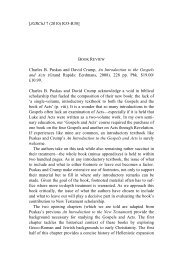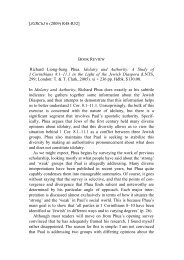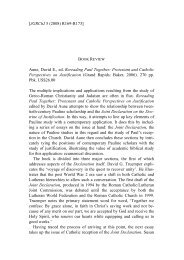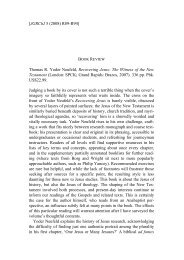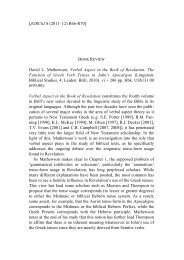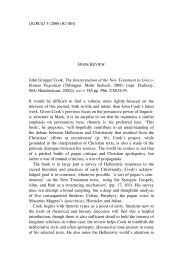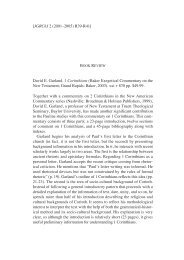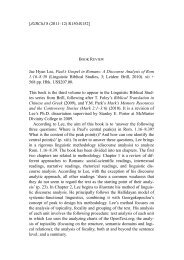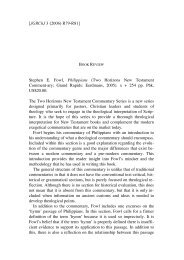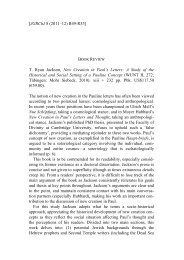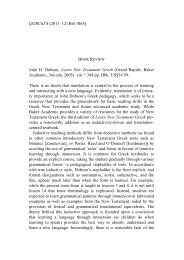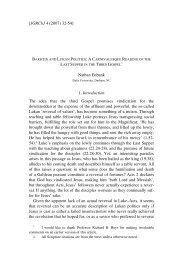The Politics of Ephesians and the Empire - Journal of Greco-Roman ...
The Politics of Ephesians and the Empire - Journal of Greco-Roman ...
The Politics of Ephesians and the Empire - Journal of Greco-Roman ...
You also want an ePaper? Increase the reach of your titles
YUMPU automatically turns print PDFs into web optimized ePapers that Google loves.
Gupta & Long <strong>Politics</strong> <strong>of</strong> <strong>Ephesians</strong> <strong>and</strong> <strong>the</strong> <strong>Empire</strong> 115<br />
<strong>the</strong> evidence for accommodation is not as secure as Elliott <strong>and</strong> o<strong>the</strong>rs<br />
have indicated. In fact, <strong>the</strong> particular language <strong>of</strong> <strong>Ephesians</strong> shows many<br />
signs <strong>of</strong> counter-imperial resistance by affirming <strong>the</strong> establishment <strong>of</strong> an<br />
alternative political identity in <strong>the</strong> church assembly around Jesus Christ<br />
as <strong>the</strong> one Lord (4.5). Such a God-ordained body politic with its reigning<br />
Lord trumps, while subverting, <strong>Roman</strong> imperial prerogatives, positions<br />
<strong>and</strong> even specific titulature. <strong>The</strong>se claims are supported through studying<br />
closely <strong>the</strong> precise language, structure <strong>and</strong> rhetoric <strong>of</strong> <strong>Ephesians</strong> <strong>and</strong><br />
considering how <strong>the</strong> original author would have intended readers to<br />
recognize allusions to imperial <strong>the</strong>mes, titles <strong>and</strong> cultic imagery, which<br />
merged spiritual-heavenly <strong>and</strong> earthly realms. Through considering <strong>the</strong><br />
Household Codes (5.23–6.9) <strong>and</strong> those passages referring to rule(rs) <strong>and</strong><br />
authorities that disclose a cosmology <strong>and</strong> an apocalyptic worldview (1.15-<br />
23; 2.1-3; 3.10; 6.10-13), we will argue that <strong>Ephesians</strong> provides both a<br />
trumping critique <strong>of</strong> <strong>Roman</strong> imperial ideology <strong>and</strong> an ethical critique <strong>of</strong><br />
<strong>the</strong> predominant social values.<br />
Cosmology <strong>and</strong> Apocalyptic Worldview in <strong>Ephesians</strong><br />
One major plank in Elliott’s argument that <strong>Ephesians</strong> is imperially<br />
accommodationistic involves <strong>the</strong> letter’s cosmological <strong>and</strong> apocalyptic<br />
perspective. Elliott highlights, first, that one could perceive <strong>of</strong> <strong>the</strong><br />
constant appeal to spiritual powers in <strong>Ephesians</strong> as supporting a kind <strong>of</strong><br />
transcendentalism that makes <strong>the</strong> enemies non-earthly <strong>and</strong>, thus, believers<br />
should not bo<strong>the</strong>r being concerned with <strong>the</strong> emperor. But, secondly, even<br />
if <strong>the</strong> earthly powers are being implicated in <strong>the</strong> language in <strong>Ephesians</strong>,<br />
<strong>the</strong> notion that all are currently ‘subject’ to Christ could lead one to<br />
believe that what is happening in <strong>the</strong> empire is under <strong>the</strong> authority <strong>of</strong><br />
Christ. Elliott explains it in this way:<br />
[<strong>The</strong> <strong>the</strong>ology <strong>of</strong> <strong>Ephesians</strong> <strong>and</strong> Colossians] is inherently liable to an<br />
o<strong>the</strong>rworldly spiritualization that distracts us from <strong>the</strong> web <strong>of</strong> this-worldly<br />
power relations, or baptizes those power relations as already ‘obedient’ to<br />
Christ. 12<br />
<strong>The</strong> consequence [<strong>of</strong> <strong>the</strong> influence <strong>of</strong> <strong>the</strong>se texts] is that <strong>the</strong> language<br />
<strong>of</strong> Christ’s present lordship over <strong>the</strong> powers now too readily yields <strong>the</strong><br />
interpretation that <strong>the</strong> Powers somehow enjoy God’s blessings now. 13<br />
12. Elliott, Liberating Paul, p. 120.<br />
13. Elliott, Liberating Paul, p. 120.



